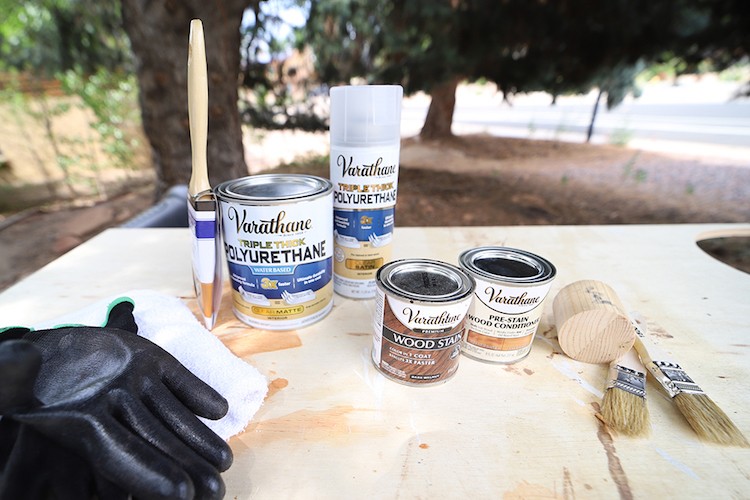
When I first started staining projects, unbeknownst to me, I was doing it all wrong. I made fundamental beginner’s mistakes and I wish I would have done some research, first! Now, I’ve learned the hard way the proper ways to stain using lots of trial and error and lots of research. And now, I bring all of this knowledge to YOU! If you’re reading this article, you’re probably about to stain—yay! I hope this tutorial is helpful for you to learn how to stain!
If you’re one to prefer video tutorials, I share these beginner steps AND a few intermediate/advanced steps over on my YouTube channel. Make sure you go check it out if you’re ready to learn a few extra staining tips (plus, I created the perfect recipe for the prettiest stain color ever, if I do say so myself)!


Step 1: Lightly Sand Your Wood
First and foremost, you need to sand your projects. This is a crucial step to making sure that everything else goes smoothly when you sand. I recommend you sand your wood with at least 120-150 grit sandpaper, but you can certainly go higher (if you have the patience!).
Step 2: Stain your Wood
- Before you begin this step, I highly recommend you test your desired stain on a leftover scrap piece of wood from your project—make sure it’s the same type of wood! Do this because it’s a large pain to remove stain if you don’t like the color. Be absolutely certain you’re staining with the right color! I picked a beautiful dark walnut color to blend.
- When you stain, use a rag or brush and paint the stain in the same direction as the grain.
- For these Varathane Premium stains, let the stain sit on your wood for 2-3 minutes to achieve a one-coat color. It may look slightly “darker” if you leave it on longer, but Varathane Premium stains are specifically created for one-coat staining, so one coat should be all you need!
- Vigorously wipe off all of the stain using your disposable rag. Don’t leave any extra stain on your project or it will be sticky to the touch.

Step 3: Let Stain Dry for 1 Hour
Before you seal your project, make sure it has enough time to fully dry. If you live somewhere that’s humid, this waiting time might take longer.
Step 4: Seal Your Wood

Especially for projects that will see any “wear and tear,” it’s recommended that you seal your wood. For the plant stands I’m staining, I’m opting for this Varathane Spar Urethane, which is a water-resistant sealant in case I spill any water as I water my plants.
- To seal your wood, use a paintbrush and use as few brush strokes as you can—this will help you avoid bubbles from forming.
- This urethane goes on milky in color and dries clear. Let each coat dry for 2 hours, lightly sand with high-grit sandpaper between coats, and add 3 coats.
- Let the urethane cure for at least 24 hours before you put into use!
Conclusion

I hope this helped you understand the basics of staining your wood projects! Don’t forget I share a LOT more tips for staining projects over on my YouTube video. Check it out, let me know what you think with a comment, and good luck staining!
The post How to Stain Soft Woods with Varathane Premium appeared first on The Home Depot Blog.
